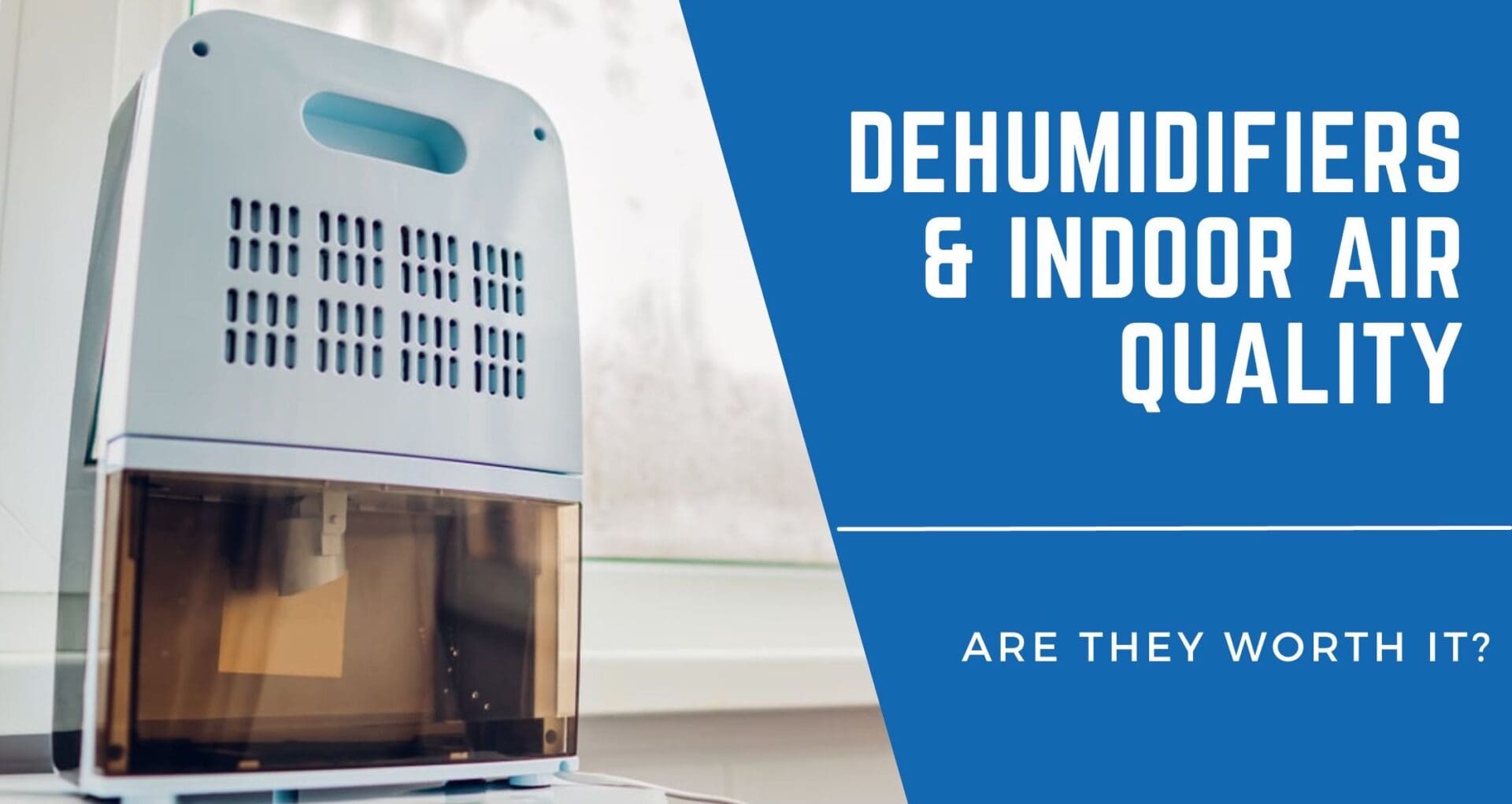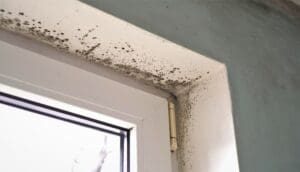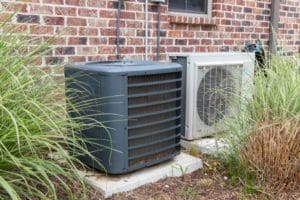
If you’ve noticed your home is humid and someone mentioned that a dehumidifier will fix that problem, you might ask yourself—what does a dehumidifier do? In the simplest sense, dehumidifiers remove moisture from indoor air. Removing excess moisture from your home can help improve indoor air quality.
What Is a Dehumidifier?
A dehumidifier is an appliance that you can use to remove moisture from the air. They work in enclosed spaces like homes and require electricity to function. You can install a dehumidifier into an HVAC system or use a stand-alone model.
What Does a Dehumidifier Do?

A dehumidifier removes water from indoor air. It does this in a similar fashion to an air conditioner. Compressors and refrigeration coils bring the temperature of the air down so that it can’t hold as much moisture. Condensation then forms and is caught in a basin or catch bucket.
The air is then rewarmed to standard temperature and returned to the home. You can install dehumidifiers alongside an HVAC system to help keep your indoor air quality in excellent condition.
Signs You Need a Dehumidifier

One significant sign you may need a dehumidifier is if your space feels constantly damp or clammy. Other signs to look out for include a musty or mildew-like smell and window condensation. In severe cases where the moisture is too high, you may notice the presence of mold spots on ceilings or walls.
If you or your family members have frequent respiratory problems or allergic reactions, high humidity can make them worse. If you’ve had a flood in the area or your basement is often damp, you will significantly benefit from using a dehumidifier. A dehumidifier will help prevent mold growth and protect your property.
If you’re storing sensitive items, like books, electronics, or clothing, a dehumidifier can also help to protect them. If you notice these items ever feel damp or have a musty odor, the environment is too humid. Peeling wallpaper or blistering paint on walls can also mean too much water in the air.
Do Humidifiers Work?
Yes, dehumidifiers work to reduce the moisture in the air. They are used in environments where there’s excess humidity, which can lead to issues like mold, dust mites, and poor indoor air quality.
A dehumidifier follows several steps to remove moisture from the air. In order, it:
- Draws moist air into the unit
- Cooling the air to condense the moisture into liquid
- Collects the water in a tank
- Expells the drier air back into the home
Over time, this process can significantly lower the humidity level in a given space.
Dehumidifiers are the most useful in basements and humid climates, where the air is more consistently damp. On top of improving indoor air quality, dehumidifiers also help prevent damage to materials and structures that can be impacted by excessive moisture, like drywall in the basement.
Dehumidifiers are also popular in regions with humid climates. Areas in and around coastal regions like Florida and some continental areas often need dehumidifiers due to an extreme humidity environment. There are some other benefits to how humidifiers work as well.
Benefits for Indoor Air Quality
- Indoor air quality will improve if there is less moisture in the air.
- Allergens and other contaminants, like mold, will be reduced by installing a dehumidifier.
- Future contamination will also be reduced as the conditions for mold to grow, for instance, will be reduced.
- This will improve the air quality and help anyone who has a respiratory illness or condition.
- Allergy or asthma attacks may even be reduced in frequency and seriousness.
Dehumidifiers vs HVAC Systems

Air conditioning does help to reduce the humidity in a room, but that is not their specific purpose. Dehumidifiers are far more effective at removing humidity and can be used alongside air conditioning as a more complete solution. But the differences don’t start or end there.
Dehumidifiers cost less than an air conditioner or any HVAC system. They also require less energy to run, so they won’t make your energy bill shoot through the roof.
FAQ
After years of installing HVAC systems and dehumidifiers, it’s safe to say that our experts at Performance have answered many questions. Here are a few of the most common questions we’re asked on a regular basis.
Will a Dehumidifier Cool a Room?
What does a dehumidifier do? A common misconception is that a dehumidifier can help cool a room. While both a dehumidifier and an air conditioner use coils and compressors, their functions are fundamentally different.
Dehumidifiers don’t remove the heat from the air to cool a space or home. Instead, a dehumidifier removes the moisture from the air, which by itself, doesn’t lower the temperature of a room.
What Is the Ideal Humidity Setting?
The right humidity setting on your new dehumidifier is between 30% and 50%. The spread is so wide because there are a lot of factors at play.
For example, a home with too much moisture can have mold and mildew. On the flip side, you don’t want your home to be too dry either because that can lead to issues like bacteria growth. The key is to find a range in which you are the most comfortable with.
Experiment with your humidity levels until you are comfortable with one. Many people prefer dryer air for the way it feels to breathe, as well as the health benefits it can bring.
If you live in Florida or another high-humidity environment, it might be necessary to experiment down around the 30% mark. In the end, what matters most is what you’re comfortable with while ensuring the air isn’t too moist.
Do I Need a Humidifier or a Dehumidifier?
Whether you need a dehumidifier vs. a humidifier will depend on what level of humidity is inside your home. Your environment often determines what the inside humidity of your home is like. Residing in the humid climate of Florida, you’re more likely to discover the benefits of a dehumidifier.
A good rule of thumb to go by is to keep the humidity around 30% to 50%. This range will give you the benefits of having a healthy amount of humidity without all the downsides, like mold and mildew growth. It will also help keep your sinuses healthy and your sensitive materials safe.
For most people in Florida, the answer is clear: they need a dehumidifier. If you don’t know what kind of humidity levels you’re dealing with, you can pick up a hygrometer. This is a simple, affordable device that will tell you the level of moisture in your home so you can make an informed decision.
If you’re ready to have a dehumidifier installed, book your appointment online today with us.

